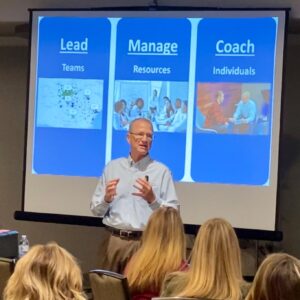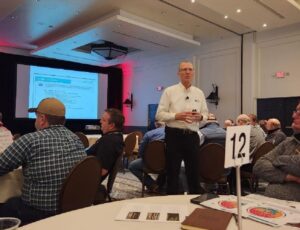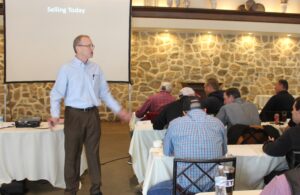Letting Go to Grow
To advance through the stages of a sales career, you need to learn the toughest and most important step of letting go!
 Listen to Today’s Blog on Podcast
Listen to Today’s Blog on Podcast
If you haven’t heard of how the monkey trap works, let me explain. The hunter places bait inside of a hole, which is big enough for the monkey to slide their hand into. However, the hole is not big enough for the monkey to get its hand out once it grabs the bait. The monkey will not let go of the bait in order to be free.
What does that have to do with sales, you ask? Lots. Two of the most popular business books are built on this concept. “Good to Great” by Jim Collins and “What got you here, won’t get you there” by Marshall Goldsmith. The whole premise of these books is letting go of what you know, what made you successful, and what is making you…YOU. Letting go allows us to grow, improve and move to the next or better place in our lives.
I recently had the privilege of writing an article for Feed & Grain Magazine,
The 4 Stages in Your Sales Territory. It covers the four stages we go through in sales over the course of our selling career. From Startup to Gaining Momentum to Full Throttle to Coasting. Read it to gain a better understanding of what every salesperson goes through. The one thing I didn’t discuss in the article is how to move from one stage to the next, which is the skill of “Letting Go”.
Just a few other analogies in life to understand letting go:
- To successfully play tag, you have to let go of home base and run or it’s not much of a game.
- To sail anywhere, a ship has to leave the safety of the harbor and head out to sea.
- To swing, a trapeze performer has to let go of one bar to grab the next.
- Ever go through the experience of selling your parents household items at an estate sale? Then you know all about letting go.
Ok, enough analogies, what do we specifically need to let go of in sales in order to move, improve and become great? The three toughest, most important and where I see countless salespeople struggle to let go of are:
- Customers: What?
I thought we were trying to sell more, not less. We are, but you can’t sell more if you are bogged down by low producing, high maintenance customers. We struggle terribly with this concept in Ag sales. We want to be noble and treat everyone the same, even the small guy. It’s a time killer. And in sales, time wasted means fewer sales and less opportunity to spend on higher producing customers. In Ag sales, we often have large geographic territories. This means we sign up customers in the far-reaching corners of our territory that take forever to get to. We intended to set up other customers in that area so it would be worth our time to drive all the way there. But, we didn’t. It happens. The problem is we feel a sense of loyalty to keep going back and we can’t let go.
Lastly, do a rough version of a time study. Sit down with your customer list and evaluate where you are spending the majority of your time. If it isn’t with the higher producing or highest potential customers, then let go. Quit spending time with the squeaky wheel customer that demands all your time and attention.
- Beliefs: Not all of them, just a few critical beliefs to let go of:
- Treating everyone the same: We already addressed it, but treating the small customer the same as the big customer will kill your time and sales productivity. Get over it and move on. Find someone who has done it and learn from them. Commission programs are there for a reason…to incentivize selling more. You do that by focusing on bigger or higher potential customers.
- I have to see this customer on Tuesday, this customer on Wednesday…… Here’s my answer, “No you don’t”. When starting a coaching program with a salesperson, I always go through a time mapping exercise to find out where a salesperson is spending their time. The next step is to challenge them when I see it does not line up with sales generation or growth. Their excuse for not selling more is always…. you guessed it, “Time”. Since we can’t make more than 24 hours in a day, we typically have to reduce unproductive time by letting go of less productive customers.
- I need to sell Mr or Mrs. Big: Again, here’s my answer, “No you don’t”. We all have them in our territory. I call them the “Wal-Mart Customer”. It might be the 10,000-acre producer, the 5,000-cow dairy or the 30 location Ag Retailer. They are big and everyone in your company, including you, wants you to sell them. Landing this account would make you the hero! Sure, go see them. Sure, give them the time and effort they are due. However, keep some perspective on these accounts. First, they are big and every competitor is chasing them as well. This typically means you are going to sacrifice margin in order to sell them. Sometimes, so much margin, you aren’t profitable. So much margin, you are “running for fun” and don’t make enough margin to replace the trucks and equipment you are wearing out selling Mr. and Mrs. Big. Keep your hand in the game of selling this account, but build your territory on the core niche of customers you are designed for.
- Territory: The last area I want to cover on letting go is the most difficult. There comes a point when you have reached the peak, leveled off, gave it your all and need to let go of your territory. For some, it happens soon in their selling career. A few years in, they don’t have the same fire and energy towards selling and growing their territory they had in the beginning. When coaching and leading these folks, we often discuss the possibility that sales might not be the best career choice. I’ve had some of these turn into career change discussions. If they are good, hard-working people, then keep them in the company by connecting with other departments: production, purchasing, technical/research.
For others, the need to let go of their territory comes later in their career. The may want to move into sales management or might need to retire. These can be scary as they are new and different than selling. Being a good salesperson does not directly translate into being a good sales manager. They worry, “What if I give up my territory, am not good at or don’t like being a manager? Then what do I do?” Good question and you need to think about the possibilities before letting go. The question I ask an individual in this situation is, “Is staying in the current role, the right answer for you long term?” If the answer is something like, “No or I can’t imagine being in this territory another year or I need to make a change” then I encourage them to make the leap. Let go of the bait that’s caught them in the monkey trap.
I know letting go is not easy. It can generate a lot of fear and anxiety in our life that we just don’t need. So, we push the change aside and hang on to what we know. Our belief, “Better to be a known good than a potential Great…. because it might also be an epic failure”. However, once you do let go, the feeling of being free is unbelievable. You will free up resources that are allocated elsewhere. The most important of these resources is your time!
Additionally, it almost never turns out to be as bad as you thought it might be. Even if you completely fall flat on your face and fail, short of dying, you will learn an incredible amount about yourself and who you truly are.
So, my question for you today is, “What do you need to let go of? What are you hanging on to that is killing your productivity? What customer, geographic area, or belief has YOU caught in a monkey trap?”
Now figure out a way to let it go!
For more information on Ag sales training, coaching or business development, contact
Greg Martinelli at Ag Sales Professionals, LLC
at (608) 751-6971.
Email is Greg@GregMartinelli.net
Web site is www.GregMartinelli.net




